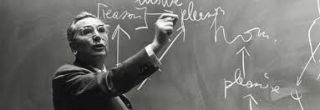Sex
Food, Sex, Drugs, and the Meaning of Life
Is overindulgence a sign of existential crisis?
Posted January 27, 2013
Susan* came to me for counseling saying her weight and eating is “out of control.” She is 41 years old and 230 pounds. She weighed 150 pounds when she got married 15 years ago, but gained weight with each of 4 pregnancies and then continued to gain weight thereafter. She home schools her children full-time. She says she believes she has a “food addiction” because she thinks about eating almost all the time. She blames this on being home all day surrounded by food. When she’s not having a meal or a snack, she’s thinking about when the next one will be. She says it is not so bad that she can’t get her work done or that it is the only thing she thinks about, but food is present in her mind a great deal of the time. She finds herself eating even when she’s not hungry. When I asked why, she said, “I don’t know. It tastes good, it feels good. It is the highlight of my day.” She then notes that a great deal of guilt and shame follows episodes of overeating. She has episodes of binges 2-3 times a month in which she eats a huge amount of food from her hidden “stash” when she’s alone. She feels guilty and out of control when these episodes happen. She likens her relationship with food as having a “secret life” and that she would be horrified if her husband or friends knew what she was doing. Her husband believes she has made every effort toward getting her weight under control and reassures her that the pregnancies probably just slowed down her metabolism. She feels tremendously guilty when he is supportive knowing that he isn’t aware of her habits. She has tried several popular diets (Zone, Atkins, South Beach, Slim Fast, Jenny Craig) and has been in and out of Weight Watchers more times than she can count. She says she sticks to a diet for a few weeks, sometimes less, but then inevitably falls back into her old pattern.
What is wrong with Susan? Has she just not found the right diet? Not likely. The root of Susan’s problem is not in her eating habits; her eating habits are the consequence of her problem. The problem at hand is that her life is heavily driven by the pursuit of a basic immediate pleasure and we need to find out why.

I recently read Viktor Frankl’s Man’s Search for Meaning and he lends some keen insight into such a situation. Frankl, an existential psychotherapist, termed a situation like Susan’s, an “existential vacuum.” Frankl says that the existential vacuum exists when one is lacking true meaning in life. In the absence of meaning, one’s life becomes dictated by basic drives. The existential vacuum, Frankl says, manifests in boredom, depression, anxiety, and/or addiction. In his book he focuses on how sexual compensation is often the consequence of the existential vacuum, however he first published the book in 1946, long before society fell in love with drugs and food, greatly expanding its slate of vices. The journey out of the existential vacuum involves intensifying the meaning in your life. But how does one go about doing this?
Frankl says that this task is not accomplished merely via introspection. It must be accomplished via experience. He suggests three experiences, 1) creating a work or helping others; 2) experiencing something genuinely, such as nature, culture, or love for another person; and 3) finding meaning in your suffering. I highly recommend Frankl’s book for an elaboration on these points. In the meantime, my take away is that meaning can be found when you put yourself behind something that has benefits far beyond advancing yourself either financially or otherwise, when you experience genuine love and appreciation for things and people, and when you approach unavoidable suffering as a challenge to change yourself. All of these experiences increase your awareness of who you are and the meaning of your existence.
Frankl contends that life has the potential for meaning in any circumstance no matter how dire and finding this meaning is necessary to finding your path in life, to surviving hardship and loss, and achieving peace of mind. As a survivor of a concentration camp in Auschwitz, he observed a striking connection between the prisoner’s ability to find meaning and the prisoner’s survival. Frankl recalls how over time he could predict when one of the prisoners in the concentration camp was about to die. He noted that whenever a prisoner traded his daily bread ration for a cigarette, he would invariably kill himself or submit himself to be exterminated shortly thereafter. This simple act showed that immediate pleasure had trumped survival and hope, because for that person, life had lost meaning.
All of this isn’t to suggest that Susan does not find meaning in motherhood, educating her children, in her marriage, or life activities. She may or may not. Her being trapped in the existential vacuum only suggests that she needs to find greater meaning in both her life and suffering, and only then will she notice a reduced reliance on basic pleasures to get through the day. A possibility is that she is buckling under the stress of her roles so much that she has disconnected from their meaning entirely. Her preoccupation with food is certainly evidence that she is not connecting with her experiences. The solution is not necessarily to give up these roles, but rather to explore what is missing. It could be that her current role is lacking a pursuit that gives her life greater meaning or that she has signed onto a role that is not bringing the satisfaction and purpose to her life that she originally hoped. Nobody can tell Susan what is missing, she must discover it through her own exploration.

How do you know if you have found meaning? The end game of “finding meaning” isn’t happiness, but more likely the absence of the existential vacuum. Frankl intentionally does not equate “meaning” with happiness or even success. In fact he urges people to avoid the pursuits of happiness and success, for they are the side effects of finding a life worth living. He says:
“Don’t aim at success—the more you aim at it and make it a target, the more you are going to miss it. For success, like happiness, cannot be pursued; it must ensue, and it only does so as the unintended side effect of one’s personal dedication to a cause greater than oneself or as the byproduct of one’s surrender to a person other than oneself.”
I tend to wonder if this sentiment applies in the case of Susan’s weight loss pursuit. Perhaps she should not focus on weight loss at all, but rather on finding the meaning in her life that will result in a healthy body as a consequence?

Consider this analogy. Susan going on diet to solve her problems is akin to using a bucket to bail water out of a boat that is sinking due to a hole in the bottom. Dieting feels like a tremendous effort because the boat continues to sink as long as the hole remains. Diet books just show her new ways to bail water out, which is why they never really help. Her efforts would be lessened if she finally sealed the source of the leak. In the meantime, her life wavers between succumbing and bailing, the former which generates guilt and shame, the latter which is exhausting.
If you relate to Susan’s struggles, I do not believe that diet books or the latest advances in nutrition research will ever help. Set these things aside and instead ponder the source of your discontent. Broaden your experiences to discover a richer life, more fulfilling passions, and perhaps most importantly, see the challenge that your suffering has laid in front of you.
Frankl, V. E. (1984). Man’s Search for Meaning: Revised and Updated. First Washington Square Press. New York, NY.
*Susan is a fictional patient based on an amalgam of many patients who have similar characteristics and struggles.




